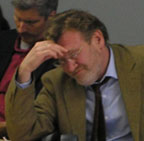Petition seeks a ‘soft law’ ruling in Manneh disappearance
Eyewitnesses saw him being led away. “We were in our Banjul newsroom on July 7, 2006, working on the next issue of the Daily Observer, when two plainclothes officers with the Gambian National Intelligence Agency approached Chief,” wrote Observer editor and correspondent Ousman Darboe. “I knew one of the officers as a Corporal Sey. They…
In ignoring Cuban jailings, Black Caucus disappoints
Clarence Page, the Chicago Tribune columnist and CPJ board member, is disappointed the Congressional Black Caucus ignored human rights violations, including the imprisonment of journalists, during its recent visit to Cuba. In his column, Page notes that Cuba is now jailing 21 editors and writers, making it the world’s second-leading jailer of journalists.
New film documents Burma’s undercover reporters
“Get that guy–he’s a reporter.” The order, shouted in Burmese amid the chilling sound of gunfire, can be heard in the preview of the new documentary, “Burma VJ: Reporting from a Closed Country” by Danish filmmaker Anders Ostergaard. The preview also includes the now-notorious footage of a Burmese soldier fatally shooting Japanese cameraman Kenji Nagai…

Keep digging into disappearance of Gambia’s Manneh
The whereabouts of “Chief” Ebrima Manneh, right, the Gambian journalist who has been missing since his arrest by state security agents in July 2006, has become an urgent issue again in the country’s media houses, homes, and human rights offices. The question needs to be studied carefully, and no one should draw quick conclusions.
Mission Journal: Nicaragua slides backward
Nicaragua’s press freedom conditions have seriously deteriorated in the last year, local journalists and free press advocates told Americas Senior Program Coordinator Carlos Lauría and me during a weeklong visit to Managua. We concluded our mission on Friday and will issue a report next month on the nation’s press conditions.
Frank Smyth on House press bills
CPJ Washington Representative Frank Smyth had a posting on The Hill Blog on April 3 about the House’s passing of a “shield bill” to protect reporters from revealing their sources, and another bill, the “Daniel Pearl Freedom of the Press Act,” named after the late Wall Street Journal reporter. Read Smyth’s post here.
Sri Lanka on State Department’s radar
The dire situation for journalists in Sri Lanka who have fallen out of favor with the government has not gone unnoticed at the U.S. State Department. On March 23, Secretary of State Hillary Clinton sent a letter to Senator Robert Casey, who chaired the Senate Foreign Affairs subcommittee hearing on Sri Lanka on February 24.…

Corrupt Russian police are a ‘dark force’ against press
Leonid Nikitinsky has a dry sense of humor. “Unless you are killed in a very interesting way, don’t come and see me,” he told an audience at CPJ’s offices on Thursday. There are, after all, too many murders for him to cover, said Nikitinsky, right, a court reporter for Russia’s Novaya Gazeta.
Mission Journal: Lost in Managua
There are few street names and no addresses in Managua, a famously disorganized city whose downtown was destroyed in a 1972 earthquake and never rebuilt. To find a house, office, or government building you need directions which are only intelligible to locals. Here are couple of examples:
Joel Simon on environmental journalism
Environmental reporting around the world is under siege. Newsrooms in the United States are slashing budgets for the beat, and repressive countries are taking action to stifle reporting. Journalists are facing threats to their work–and sometimes, their lives. In the current issue of World Policy Journal, CPJ Executive Director Joel Simon calls on environmental and press…